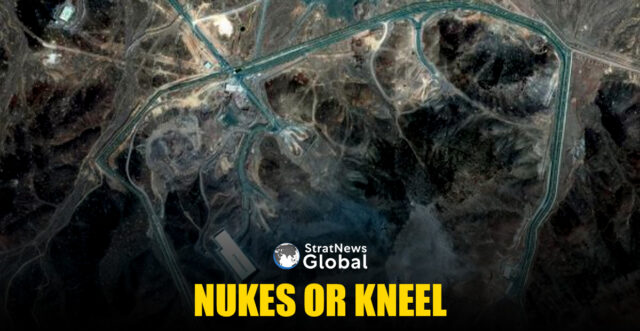If you defy U.S. diktat without nukes, you’re next.
Iran just found that out the hard way.
On the night of June 22, 2025, the United States launched Operation Midnight Hammer, a sweeping military campaign that bombed three of Iran’s most fortified nuclear facilities—Fordow, Natanz, and Isfahan—with precision bunker-busting munitions.
U.S. stealth bombers struck under cover of night. Submarines launched cruise missiles from the Gulf. The world awoke to a charred warning: cross Washington without nuclear weapons, and you will be flattened.
President Trump called the mission a “spectacular success,” claiming the strikes had “totally obliterated” Iran’s nuclear infrastructure. Iran insists the damage was limited—but that is beside the point. The message was unmistakable: not having nuclear weapons is now a national security liability of the highest order.
This is not new. This is not a break from the norm. This is the norm.
Iran is only the latest chapter in a long, bloody book. The United States has demonstrated for decades that it respects the sovereignty of other nations only when those nations either toe the line, or possess nuclear weapons.
- Iraq, 2003: No WMDs, no nukes—flattened. Over a million lives lost, a nation turned to ash.
- Libya, 2011: Muammar Gaddafi agreed to dismantle his nuclear program. NATO struck. He was dragged through the dirt and executed on camera.
- Syria: No nuclear program, just defiance. Bombed into fragmentation, regime change attempted. The fact that it is now run by former Al Qaeda operatives is another story.
- North Korea: Armed with nuclear warheads. Brutal dictatorship, but untouched by U.S. bombs. Why? Because Pyongyang has the ultimate deterrent.
This isn’t theory—it’s a live demonstration of how global power functions. The U.S. does not bomb nuclear-armed countries. That’s not restraint. That’s fear. And it makes the logic of going nuclear brutally rational.
The recent strike on Iran wasn’t just about military targets. It wasn’t a war. It was a warning.
- Fordow, buried deep under a mountain, was hit with the most powerful non-nuclear conventional bombs in the U.S. arsenal.
- Natanz, the heart of Iran’s centrifuge program, went dark.
- Isfahan, a key node in enrichment and conversion, was struck despite heavy defences.
Iran, humiliated and boxed in, responded with fury—but limited fire. Its options are constrained. Why? Because it still doesn’t have a bomb.
Tehran followed the rules. It negotiated. It signed the JCPOA. It allowed IAEA inspections. And for its trouble, it got bombed. Again, the lesson to the rest of the world is clear: agreements are not protection. Only nukes are.
International law prohibits the use of force except in self-defence or with Security Council approval. None of that applied here. The U.S. acted unilaterally, under the same rationale it always uses: pre-emptive defence, WMD prevention, regime behaviour.
The result is not just a violation of sovereignty—it’s a demolition of trust in any international security arrangement that doesn’t end with a warhead.
The U.S. says it wants to stop nuclear proliferation. But its actions guarantee the opposite. The signal it has sent to the world—loud, clear, and laced with steel—is this: If you give up your nuclear program, you’re signing your own death warrant.
Ask any leader in Tehran today. Ask Pyongyang. Ask any state under sanctions or pressure: would they rather be Libya or North Korea?
The answer is obvious—and terrifying.
Let’s be clear: nuclear proliferation is a nightmare scenario. The more fingers on the red button, the greater the risk of apocalypse.
But the U.S. has built a world where the only guaranteed protection from invasion is possession of those very buttons.
This isn’t a matter of ideology. It’s math.
- The U.S. has the most powerful military in the world.
- It uses it liberally and selectively.
- It respects nuclear deterrence.
From there, the strategic calculus for weaker states is simple: develop nuclear weapons, or risk obliteration. It’s not right. It’s not stable.
But it is reality.
There’s a path out of this spiral, but it starts not with threats, sanctions, or strikes—but with the U.S. reining in its own imperial behaviour.
- Stop using airstrikes as diplomacy.
- Recommit to arms control with all parties, not just allies.
- Provide genuine, enforceable security guarantees to states who forgo nuclear weapons—not broken promises.
Until that happens, the logic stands unchallenged: if you don’t have nukes and you say “no” to America, you’re a target.
Iran is just the latest proof. It will not be the last.
Every missile that hit Natanz was a message. Every bunker-busting bomb that cratered Fordow shouted the same thing to the world: nuclear weapons are not just tools of war—they are shields of survival.
In the empire’s game, the rules are written in rubble.
Go nuclear—or go under.
In a career spanning three decades and counting, Ramananda (Ram to his friends) has been the foreign editor of The Telegraph, Outlook Magazine and the New Indian Express. He helped set up rediff.com’s editorial operations in San Jose and New York, helmed sify.com, and was the founder editor of India.com.
His work has featured in national and international publications like the Al Jazeera Centre for Studies, Global Times and Ashahi Shimbun. But his one constant over all these years, he says, has been the attempt to understand rising India’s place in the world.
He can rustle up a mean salad, his oil-less pepper chicken is to die for, and all it takes is some beer and rhythm and blues to rock his soul.
Talk to him about foreign and strategic affairs, media, South Asia, China, and of course India.





